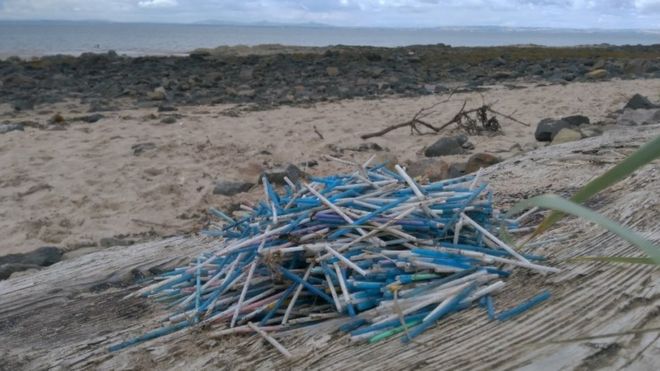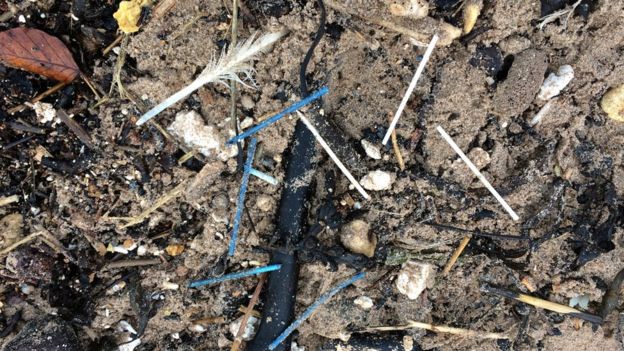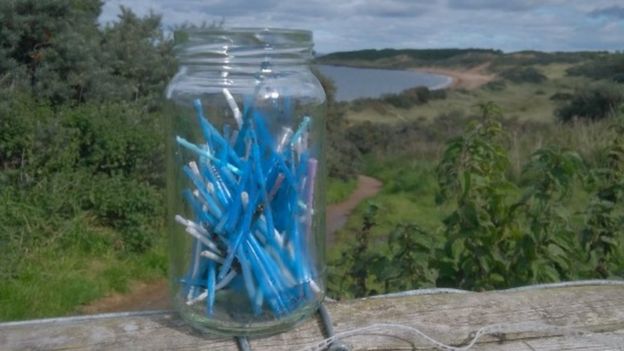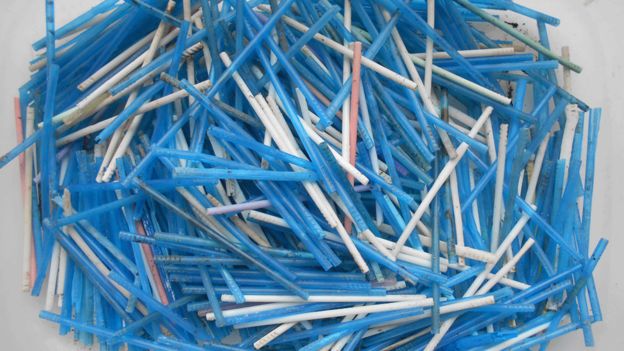 CLARE CAVERS
CLARE CAVERS
The sale and manufacture of plastic-stemmed cotton buds is to be banned under new Scottish government plans.
The move follows concerns about the number of buds being washed up on beaches after being flushed down toilets.
Most major retailers have already switched to paper-stemmed buds following a campaign but plastic ones are still being sold.
Hundreds were recently found on Gullane Beach.
Plastic cotton buds are consistently listed in the top ten forms of beach litter in surveys by the Marine Conservation Society, and Scottish environmental charity Fidra has been working with industry to promote biodegradable alternatives.
Fidra, which runs the Cotton Bud Project in East Lothian, believes there are several hundreds of brands being imported from China and sold by smaller retailers.
It found hundreds of buds on a 100m stretch of shore at Gullane in a recent beach clean.

The proposal to introduce a ban will now be put to public consultation.
Environment Secretary Roseanna Cunningham said: "Banning plastic cotton buds would be a clear sign of our ambition to address marine plastics and demonstrate further leadership on this issue.
"Despite various campaigns, people are continuing to flush litter down their toilets and this has to stop.
"Scotland's sewerage infrastructure collects and treats some 945 million litres of waste water each day. These systems are not designed to remove small plastic items such as plastic buds which can kill marine animals and birds that swallow them.
"These products are completely unnecessary as biodegradable alternatives are readily available. The need for action is clear and I would encourage everyone with an interest in safeguarding our natural environment to take part in the consultation when it opens."
 CLARE CAVERS
CLARE CAVERS
In 2017 the pharmaceutical firm Johnson and Johnson became the first major manufacturer to switch away from plastic.
All the major supermarkets have followed suit by either switching to biodegradable paper or committing to doing so.
Waitrose has estimated to have saved 21 tonnes of plastic through the policy.
Alasdair Neilson, who runs The Cotton Bud Project, said: "This progressive step will be welcomed by everyone who has seen cotton buds polluting our beaches and harming our wildlife.
"A ban would support the responsible businesses that have already removed this single-use plastic item from their shelves. Let's hope it also marks a bigger shift in the way we use and value plastics."
The Marine Conservation Society joined forces with the Cotton Bud Project and found an average 29 buds per 100m of beach surveyed.
 FIDRA
FIDRA
The group's conservation officer, Catherine Gemmell said: "After finding over 3,500 plastic cotton bud sticks on beaches across Scotland during our Great British Beach Clean in 2017, we're delighted to hear Cabinet Secretary Roseanna Cunningham's plans to ban the making and selling of them in Scotland.
"For things that are maybe used for just five minutes to clean out ears or put on eye make-up - they can cause huge impacts on our oceans for hundreds of years."
Dr Lyndsey Dodds, head of marine policy at WWF, welcomed the move.
She said: "Cotton buds are some of the most pervasive forms of marine pollution so a ban is very welcome and a step in the right direction.
"We know plastic is suffocating our seas and devastating our wildlife with millions of birds, fish and mammals dying each year because of the plastic in our oceans.
"Plastics are also finding their way into the food we eat and the water we drink so saving our oceans will require further ambitious action from governments, industry and consumers."
Peter Farrer, from Scottish Water, said: "By disposing of items appropriately, the public can play a significant part in helping to reduce the amount of debris which either ends up in our sewerage network and into rivers, coastal waters and beaches.
"Changing behaviours at home, or at work, by not flushing anything other than the 3Ps - pee, poo and paper - will ultimately have a positive impact on our wider environment."
No comments:
Post a Comment